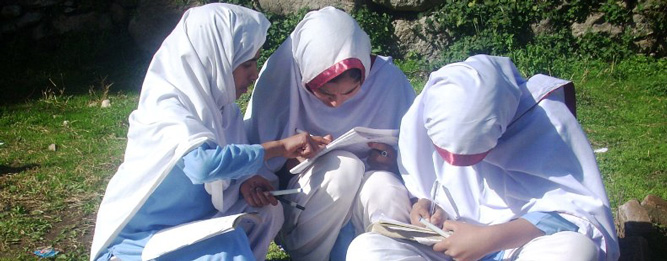
Frequently Asked Questions
What does the word “hoshyar” mean?
In Urdu and related languages, it means “smart, intelligent, aware” and “on the ball.”
Is the Hoshyar Foundation affiliated with any religious or political organization?
No, it is completely secular and apolitical.
Why does Hoshyar focus on educating girls in Pakistan?
Pakistan has the second highest number of out-of-school girls in the world. Hoshyar focuses on secondary schooling because after grade five, girls and boys must study separately, and very few schools exist solely for girls at the higher levels.
How many schools does Hoshyar support?
In 2018, Hoshyar supports 12 schools.
How many girls has Hoshyar helped to attend school?
Hoshyar has helped more than 1,200 girls attend school.
How does Hoshyar work with the communities it serves?
We respond to community proposals and support their efforts through local non-governmental organizations (NGOs).
Which school costs does Hoshyar provide?
Tuition, salaries for teachers and staff, books, uniforms, utilities, transportation, furniture and equipment. We also support school libraries and special events.
How does Hoshyar oversee the operation of the schools it sponsors?
The Executive Director visits the schools regularly and works closely with the local NGOs, who monitor each school and report back to us monthly.
What subjects are taught in the schools?
Compulsory subjects are math, science, social studies, Urdu, English, art and Islamics. Some students are able to study Punjabi and computer training in high school.
What kinds of extra-curricular activities are made possible by Hoshyar?
Medical treatment, annual school outings, computer study, and monthly bookmobile visits to the school.
How does Hoshyar ensure that teachers are well-trained?
Hoshyar sponsors teacher training workshops and underwrites the costs of professional development programs for teachers pursuing higher degrees.
What is the difference between formal education and literacy training?
Formal education (K-10) includes the compulsory subjects listed above, following a standardized curriculum set by the government. Students are in class for about six hours per day. Literacy training uses a different set of materials and is designed for working girls and women. Classes are held after work for two hours a day.
What is the impact of Hoshyar’s literacy projects?
Students who complete literacy and numeracy training gain the ability to read and write, to understand the charges on their bills and pay them themselves, to read and sign contracts for piecework, and to read signs and participate with greater confidence in the world outside their home and neighborhood. They make sure their children are literate and send them to school.
How important is female education to rural families?
Rural families rely on any member who can read and write to help them negotiate the outside world. Educated women marry later, bear fewer and healthier children, and educate their children. This is true for rural as well as urban families. However, it can be difficult to sacrifice the labor of school-going girls, and this is why some rural families do not want to send their girls to school.
How is Hoshyar staffed?
Hoshyar is operated entirely by volunteers in the U.S. who work directly with local partners in Pakistan.
How can I donate to Hoshyar?
You can donate by PayPal on our website, or send a check to Hoshyar Foundation, P.O. Box 28502, Austin TX 78755.
What is the relationship between the Hoshyar Foundation and Kilimania?
Hoshyar is a 501(c)(3) tax-exempt nonprofit organization. Kilimania: Fine and Tribal Rugs from Afghanistan is an independent, for-profit business which donates its profits to Hoshyar.
